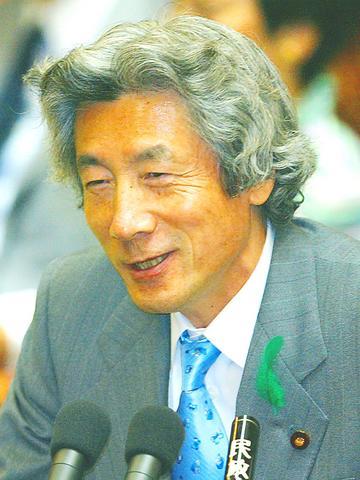Japan's Prime Minister Junichiro Koizumi marked his third anniversary in office yesterday boosted by firm public support and a clean sweep for his ruling party in weekend by-elections.
"My policy of `no reform, no recovery' does not waver," Koizumi said in parliament after his Liberal Democratic Party (LDP) won all three seats contested in Sunday's ballots in the run-up to national polls in July.
"I am now convinced my reform policy was right," he said, arguing curbs on fiscal spending by the government had led to signs of emerging recovery by the Japanese economy.

PHOTO: APN
"I want to make these bright signs spread to regional cities and smaller companies [from major cities and giant corporations] by stepping up reforms," he said.
A weekend telephone poll of 1,000 adults by the TV Tokyo private network revealed strong support for Koizumi among voters.
About 53 percent of those questioned backed the premier, down from the sky-high 81 percent immediately after he took office but up from 45 percent after his first year in office.
Analysts have said the Koizumi administration escaped political disaster when five Japanese civilians taken hostage in Iraq this month were released unharmed.
Koizumi had refused the demands of Iraqi militants who had threatened to kill three of the hostages unless Tokyo withdrew its 550 soldiers in Iraq.
Although two of the three by-elections had been expected to be close, the LDP was spared a voter backlash either for sending troops to Iraq or for an ongoing battle over pension reform.
Instead the conservative party dealt a blow to the main opposition Democratic Party of Japan (DPJ) by holding onto all three seats in what were effectively two-way contests.
Chief Cabinet Secretary Yasuo Fukuda told reporters that "the results were very good for the ruling coalition."
In the Saitama constituency, just north of Tokyo, a first-time LDP candidate won with 45 percent of the votes cast, defeating a career politician from the DPJ by a margin of 5 percent.
The Saitama seat was considered the left-of-center opposition's best chance to draw blood as it had been vacated by an LDP lawmaker who stepped down in January following a vote-buying scandal last year.
In Hiroshima, western Japan, the ruling party was returned with 51 percent of the votes, while in Kagoshima, southern Japan, always a safe bet as an LDP stronghold, the ruling party cruised to victory with an 83 percent majority.
Voting was marked by record-low turnout in all three constituencies, at around 55 percent for Hiroshima and Kagoshima and 35 percent for Saitama.
The by-elections came just three months before July's nationwide poll for half the seats in the upper house.
Shigenori Okazaki, political analyst at UBS Securities Japan, said the clean sweep, helped by low turnout and votes mobilized by coalition partner New Komei party backed by lay Buddhists, augured well for the ruling party in the July polls.

Auschwitz survivor Eva Schloss, the stepsister of teenage diarist Anne Frank and a tireless educator about the horrors of the Holocaust, has died. She was 96. The Anne Frank Trust UK, of which Schloss was honorary president, said she died on Saturday in London, where she lived. Britain’s King Charles III said he was “privileged and proud” to have known Schloss, who cofounded the charitable trust to help young people challenge prejudice. “The horrors that she endured as a young woman are impossible to comprehend and yet she devoted the rest of her life to overcoming hatred and prejudice, promoting kindness, courage, understanding

Tens of thousands of Filipino Catholics yesterday twirled white cloths and chanted “Viva, viva,” as a centuries-old statue of Jesus Christ was paraded through the streets of Manila in the nation’s biggest annual religious event. The day-long procession began before dawn, with barefoot volunteers pulling the heavy carriage through narrow streets where the devout waited in hopes of touching the icon, believed to hold miraculous powers. Thousands of police were deployed to manage crowds that officials believe could number in the millions by the time the statue reaches its home in central Manila’s Quiapo church around midnight. More than 800 people had sought

Cambodia’s government on Wednesday said that it had arrested and extradited to China a tycoon who has been accused of running a huge online scam operation. The Cambodian Ministry of the Interior said that Prince Holding Group chairman Chen Zhi (陳志) and two other Chinese citizens were arrested and extradited on Tuesday at the request of Chinese authorities. Chen formerly had dual nationality, but his Cambodian citizenship was revoked last month, the ministry said. US prosecutors in October last year brought conspiracy charges against Chen, alleging that he had been the mastermind behind a multinational cyberfraud network, used his other businesses to launder

Uncontrolled fires burned through bushland in the Australian state of Victoria yesterday, forcing communities to evacuate and authorities to warn of a “catastrophic” fire danger rating for today. Amid temperatures that exceeded 40°C in parts of the state, two large bushfires were raging near the towns of Longwood and Walwa. The fires had destroyed at least two structures and were expected to continue to spread today as heat and wind pick up, authorities said. The Longwood fire had grown to more than 25,000 hectares in size, while the Walwa fire was 10,000 hectares and has created its own weather system, with a pyrocumulonimbus